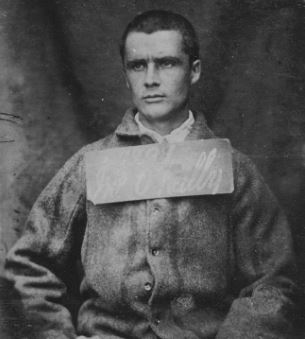They could not live by king-made codes and creeds;
They chose the path where every footstep bleeds.
Protesting, not rebelling; scorned and banned;
Through pains and prisons harried from the land
– John Boyle O’Reilly: Poem read at the Dedication of the Monument to the Pilgrim Fathers at Plymouth, Mass., 1 August, 1889.

John Boyle O’Reilly as a prisoner in 1866. Public Domain: https://commons.wikimedia.org/wiki/File:John_Boyle_O%27Reilly.jpg
On October 12, 1867, the convict ship Hougoumont left Portsmouth, England, bound for the Penal Colony of Western Australia. The last convict ship to ever leave Britain, the Hougoumont arrived laden with 279 prisoners sentenced to transportation. One of those men was John Boyle O’Reilly (1844-1890), part of a group of Irish prisoners who were members of the Irish Revolutionary Brotherhood, also known as the IRB or Fenian Brotherhood. Fearful of another Irish uprising, the Irish Revolutionary Brotherhood was persecuted by the British government who saw the movement as an intrinsic threat to their interests in Ireland. As T. W. Moody comments, the Fenians had revolutionary politics at their core: the brotherhood was ‘essentially a physical-force movement which absolutely and from the beginning, repudiated constitutional action […] [m]ore than any other school of nationalism the Fenian movement concentrated on a single aim, independence, and insisted that all other aims were beside the point’.[1]
